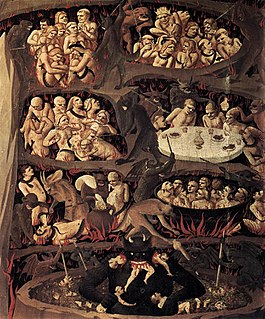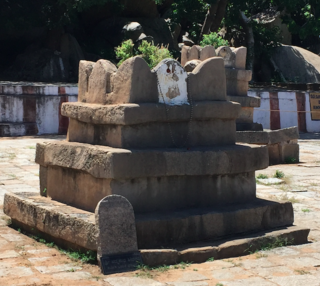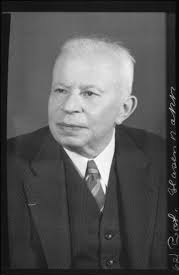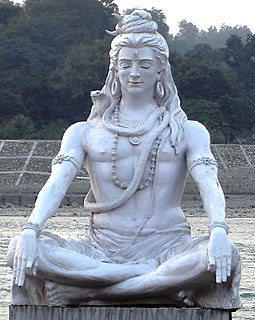Related Research Articles

Vayu is a primary Hindu deity, the lord of the winds as well as deity of breath and the spiritual father of Hanuman and Bhima. He is also known as Anila, Vyāna ('air'), Vāta, Tanuna, Pavana, and sometimes Prāṇa.

Damnation is the concept of divine punishment and torment in an afterlife for actions that were committed on Earth.

Dvaita Vedanta is a sub-school in the Vedanta tradition of Hindu philosophy. Alternatively known as Bhedavāda, Tattvavāda, Bimbapratibimbavāda, Pūrnabrahmavāda and Svatantra-Advitiya-Brahmavāda, the Dvaita Vedanta sub-school was founded by the 13th-century scholar Madhvacharya. The Dvaita Vedanta school believes that God and the individual souls (jīvātman) exist as independent realities, and these are distinct, being said that Vishnu (Narayana) is independent, and souls are dependent on him. The Dvaita school contrasts with the other two major sub-schools of Vedanta, the Advaita Vedanta of Adi Shankara which posits nondualism – that ultimate reality (Brahman) and human soul (Ātman) are identical and all reality is interconnected oneness, and Vishishtadvaita of Ramanuja which posits qualified nondualism – that ultimate reality (Brahman) and human soul are different but with the potential to be identical.

Madhvacharya, sometimes anglicised as Madhva Acharya, and also known as Pūrna Prajña and Ānanda Tīrtha, was an Indian philosopher, theologian and the chief proponent of the Dvaita (dualism) school of Vedanta. Madhva called his philosophy Tattvavāda meaning "arguments from a realist viewpoint".
In Dvaita theology, Mukti-yogyas are a class of souls classified by Shri Madhvacharya as eligible for mukti or moksha. Madhva divides souls into three classes: one class of souls which qualifies for liberation (Mukti-yogyas), another as subject to eternal rebirth or eternal transmigration (Nitya-samsarins), and a third class that is eventually condemned to eternal hell Andhatamisra (Tamo-yogyas).
In Dvaita theology, Nitya-samsarins, as classified by Shri Madhvacharya, are souls which are eternally transmigrating.

Padmanabha Tirtha was a Dvaita philosopher, scholar and the disciple of Madhvacharya. Ascending the pontifical seat after Madhva, he served as the primary commentator of his works and in doing so, significantly elucidated Madhva's terse and laconic style of writing. His pioneering efforts in expanding upon the Dvaita texts to uncover the underlying metaphysical intricacies was taken forward by the 14th Century philosopher, Jayatirtha. Padmanabha is also credited with disseminating the philosophy of Dvaita outside the Tulunadu.

Sadh Vaishnava Sampradaya or Sadh Vaishnavism, , also known as Bhagavata Sampradaya, Madhva Vaishnavism, is a denomination within the Vaishnavism tradition of Hinduism, founded by the thirteenth century philosopher Madhvacharya. It is a movement in Hinduism that developed during its classical period around the beginning of the Common Era. Philosophically, Madhva tradition is aligned with Dvaita Vedanta, and regards Madhvacharya as its founder or reformer.

Shri Uttaradi Math, is one of the premier Dvaita Vedanta monasteries (matha) descended from Madhvacharya through Padmanabha Tirtha, Jayatirtha and their disciples. The Uttarādi Math is an important institution among the Mādhvas and also deeply respected among the Vaishnavas. The Uttarādi Math is one of the major Hindu monastic institutions that has historically coordinated Madhva tradition and monastic activities through satellite institutions in South India, preserved Sanskrit literature and pursued Dvaita studies. The Uttarādi Math has been a library and a source of historic Sanskrit manuscripts. Along with other Hindu monasteries Sri matha has been active in preserving the Vedas, sponsoring students and recitals, Sanskrit scholarship, and celebrating annual Madhva Jayanthi. The current pīṭādhipati or the acharya holding the pontifical seat is Satyatma Tirtha Śrīpād. The Uttaradi Math has huge following in South India compared to other Madhva mathas. Most of Deshastha Madhvas of Maharashtra and the whole community of Gayawal Pandas in Bihar are followers of this matha.

The Embrandiri, also transliterated as Embranthiri, are a Malayali Brahmin subcaste of Tulu origin.

Otto Max Helmuth von Glasenapp was a German indologist and religious scholar who taught as a professor at the University of Konigsberg in East Prussia (1928–1944) and Tübingen (1946–1959).

Raghuttama Tirtha was an Indian philosopher, scholar, theologian and saint. He was also known as Bhavabodhacharya. His diverse oeuvre include commentaries on the works of Madhva and Jayatirtha. He served as the fourteenth pontiff of Madhvacharya Peetha - Uttaradi Math from 1557-1595, which he occupied, with remarkable distinction for thirty-nine years. He is considered to be one of the most important seers in the history of Dvaita school of thought. His shrine at Tirukoilur attracts thousands of visitors every year.

Vidyadhiraja Tirtha was a Hindu philosopher, dialectician and the seventh pontiff of Madhvacharya Peetha and served as peetadhipathi of Raghavendra Math from.

Satyanidhi Tirtha was a Hindu philosopher, scholar and saint. He served as the pontiff of Shri Uttaradi Math from 1638–1660. He was the 19th in succession from Madhvacharya. Satyanidhi Tirtha ruled the pontificate with a remarkable distinction. His life was a saga of supreme spiritual achievements.

Sri Satyabodha Tirtha was an Indian philosopher, scholar, yogi, mystic and saint. He was the 25th pontiff of Uttaradi Math and served the pontificate from March 1744 - 9 March 1783. Satyabodha Tirtha was a great yogi and was honoured by both Hindu and Muslim rulers of his time. Satyabodha Tirtha enjoyed a good fame as a miracle-man. Almost all the princes of the South India used to worship him and were his ardent disciples. Murari Rao of Gooty, Raghoji Bhosale and Fateh Singh Rao Gaekwad, were his great disciples. Satyabodha Tirtha Swamiji's mission of peace has played a prominent role during this time. He earned a reputation as the greatest of Madhva saints of his time for his un-rivaled scholarship, miraculous achievements and dynamism as the pontiff of the Uttaradi Math. So many were his achievements and so well was he liked, admired and respected by people of all castes and creeds, rich and poor, that the Uttaradi Math in Savanur got the name as Satyabodha Math after him.

Satyasandha Tirtha, was a Hindu philosopher, scholar, mystic and saint. He was the 26th pontiff of Uttaradi Math and served the pontificate from 1783-1794.

Abhinava Chandrika ;, is a Sanskrit work on Dvaita philosophy written by Satyanatha Tirtha. It is a lucid adaptation of the well-known commentary on Jayatirthas Tattvaprakāśikā, which is a commentary on Madhvacharya's Brahma-sutra bhashya. It runs to 12,600 granthas and is magnum opus of Satyanatha Tirtha.

Shri Raghunatha Tirtha, was a Hindu philosopher, scholar and saint. He served as the pontiff of Uttaradi Math from 1442–1502. He was the 19th in succession from Madhvacharya.

Shiva Stuti, is one of the most famous Stutis (poems) composed by Sri Narayana Panditacharya in praise of Lord Shiva written in Prithvi metre. Stuti means eulogy, singing praise, panegyric and to praise the virtues, deeds and nature of God by realising them in our hearts. In this stuti Narayana Panditacharya eulogised the power, beauty, virtues, qualities, and also the five forms of Lord Shiva. The Shiva Stuti consists of 13 verses and is recited daily or on special festivals like Maha Shivaratri by Hindus. Once it so happened that when Sri Narayana Panditacharya went to Rameshwaram Temple, the doors were closed. He prayed Lord Shiva with "Shiva Stuti". The temple doors opened automatically and he had the darshan of Lord Shiva.

Chalari Narasimahacharya was an Indian Hindu scholar in the Dvaita Vedānta tradition. He is the follower of Uttaradi Math and the disciple of Satyanatha Tirtha.
References
- ↑ Tapasyananda, Swami. Bhakti Schools of Vedanta pg. 177.
- ↑ Helmuth von Glasenapp: Der Hinduismus. Religion und Gesellschaft im heutigen Indien, Hildesheim 1978, p. 248.
- ↑ Helmuth von Glasenapp: Madhva's Philosophie des Vishnu-Glaubens, Geistesströmungen des Ostens vol. 2, Bonn 1923, p. 103-105.
- ↑ Glasenapp: Madhva's Philosophie des Vishnu-Glaubens, p. 65-66.
- 1 2 Sri Vadiraja: Bhugola Varnanam, commented and transl. by V. Badaryana Murthy, Bangalore 1988/89, p. 60-63.